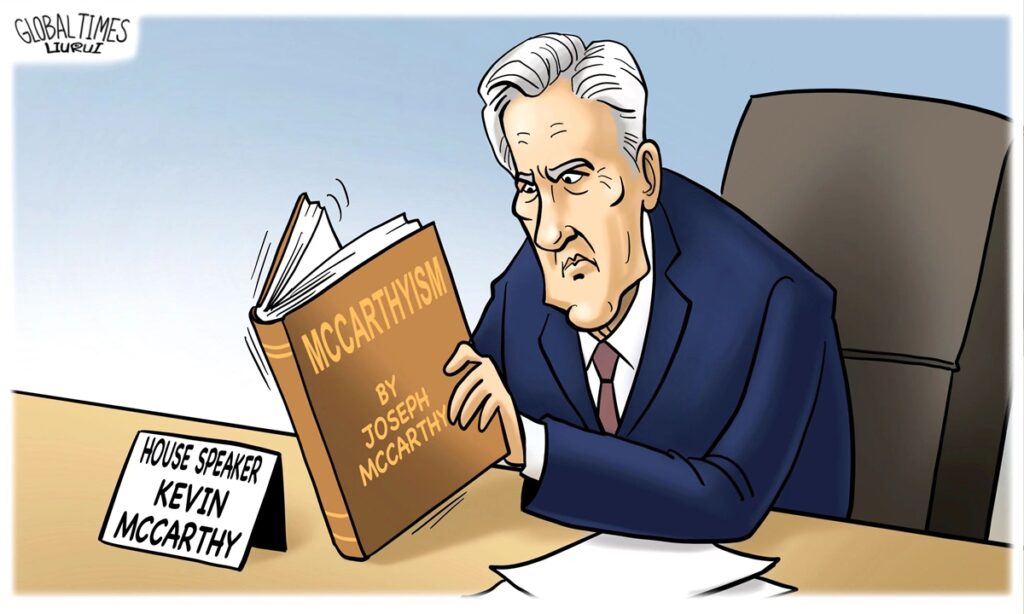The US House of Representatives voted on Tuesday in favor of a resolution establishing the Select Committee on the Strategic Competition Between the United States and the Chinese Communist Party, in a bid to address the so-called “multifaceted threats” from China to the US.
This is a fire that Kevin McCarthy, House GOP leader, set on China three days after becoming the speaker of the House. He has just experienced the humiliation and setback of a “once-in-a-century” multiple rounds of elections for the House speakership, and barely passe the test by making comprehensive compromises to the radical conservatives eventually. Therefore, McCarthy has a stronger and more urgent political motivation to demonstrate and prove his hardline stance and capability against China. The evil fire he ignited is likely to flourish, but the intent of putting up a stunt is evident.
Ahead of the midterm elections last year, McCarthy said House Republicans would create a select committee on China should they take control of the chamber. Now he is immediately “delivering” on the promise. But this big card played by McCarthy to draw support and gain attention has no creativity and is quite cheap. In the past two years, various committees, offices, or groups targeting China have almost become corny in Washington.
They are basically created to cater to the anxiety and even fear in the US toward China’s rapid development, which in turn has strengthened and stimulated such irrational sentiment, disturbing China-US relations.
The committee to be established this time has no legislative jurisdiction or authority to take legislative action on any bills or resolutions. It is only responsible for “investigating” and submitting policy recommendations on China’s economic, technological and security developments and its competition with the US.
But it is conceivable that to stand out among the various China-related committees and offices in Washington, and to underline its presence and “unique value,” the committee will definitely try every means to make trouble out of nothing, magnify small matters and seek every opportunity to create noise in China-US relations. This will further shape the negative perception of China among the American public and elites and poison the cooperation environment between China and the US.
Chairing the committee, Republican Congressman Mike Gallagher is also well-known for his anti-China stance, and he is gearing up for a big fight. The US’ China policy will face new disturbances and disruptions, at least at the congressional level.
Just look at McCarthy’s remarks at the House: “One of my greatest worries about the future is that we fall behind Communist China.” “The danger posed by our dependence on China is dire.” “China has exported oppression, aggression, and anti-Americanism.” Is there a sense of space-time confusion?
If we change just a few words, this lurid speech could serve as a political speech for the late “McCarthy,” the more infamous Joseph McCarthy. About 70 years ago, in early 1953, he became chairman of the Permanent Investigations Subcommittee of the Senate Government Operations Committee. He ascended to the pinnacle of power and also pushed the Red Scare of “McCarthyism” to the extreme. But after a few years, he died amid the scolding from the public, losing all standing and reputation.
The name “McCarthy” represents a segment of Washington’s ugly history, a sinister wind of the Cold War, and a product of occasional outbreaks of the malady of the American system. Across 70 years, the US has gone from one “McCarthy” to another.
Not only do the two share the same surname, but they are also highly similar in terms of discourse style, political posture, anti-communist logic and ideological color. The reincarnation that shackled the US is even more worrisome.
Although for decades, many American elites have continued to reflect deeply on McCarthyism, and there are also voices of vigilance against its resurgence. But when the wolves really came, the US as a whole showed a kind of numbness and dullness, and some people even contributed to it, which is really puzzling. The US public opinion rarely links the two “McCarthys.” Is this deliberate evasion, or indifference and amnesia of history? It needs to be stated that both attitudes are problematic.
It was the US and its people that suffered the most from McCarthyism back then. Today, McCarthy’s shadow is rising from the ashes of the Cold War, manifesting itself through another “McCarthy.” History is full of coincidences. Is this also a special way to send alarms and warnings to Americans? But has Washington got it?
(Global Times)




